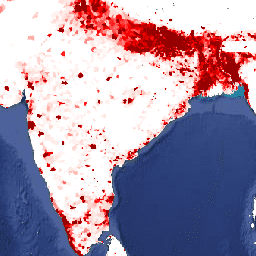Page Summary
-
This dataset provides global population density estimates for the years 2000, 2005, 2010, 2015, and 2020 at a 30 arc-second resolution.
-
Population is distributed to grid cells based on proportional allocation from census and administrative units.
-
The dataset contains one band,
population_density, representing the estimated number of persons per square kilometer. -
The data is available with a cadence of 5 years and is provided by NASA SEDAC at the Center for International Earth Science Information Network.

- Dataset Availability
- 2000-01-01T00:00:00Z–2020-01-01T00:00:00Z
- Dataset Producer
- NASA SEDAC at the Center for International Earth Science Information Network
- Cadence
- 5 Years
- Tags
Description
This dataset contains estimates of the number of persons per square kilometer consistent with national censuses and population registers. There is one image for each modeled year.
The Gridded Population of World Version 4 (GPWv4), Revision 11 models the distribution of global human population for the years 2000, 2005, 2010, 2015, and 2020 on 30 arc-second (approximately 1 km) grid cells. Population is distributed to cells using proportional allocation of population from census and administrative units. Population input data are collected at the most detailed spatial resolution available from the results of the 2010 round of censuses, which occurred between 2005 and 2014. The input data are extrapolated to produce population estimates for each modeled year.
Bands
Pixel Size
927.67 meters
Bands
| Name | Min | Max | Pixel Size | Description |
|---|---|---|---|---|
population_density |
0* | 810694* | meters | The estimated number of persons per square kilometer. |
Terms of Use
Terms of Use
Citations
Center for International Earth Science Information Network - CIESIN - Columbia University. 2018. Gridded Population of the World, Version 4 (GPWv4): Population Density, Revision 11. Palisades, NY: NASA Socioeconomic Data and Applications Center (SEDAC). https://doi.org/10.7927/H49C6VHW. Accessed DAY MONTH YEAR.
DOIs
Explore with Earth Engine
Code Editor (JavaScript)
var dataset = ee.ImageCollection('CIESIN/GPWv411/GPW_Population_Density').first(); var raster = dataset.select('population_density'); var raster_vis = { 'max': 1000.0, 'palette': [ 'ffffe7', 'FFc869', 'ffac1d', 'e17735', 'f2552c', '9f0c21' ], 'min': 200.0 }; Map.setCenter(79.1, 19.81, 3); Map.addLayer(raster, raster_vis, 'population_density');